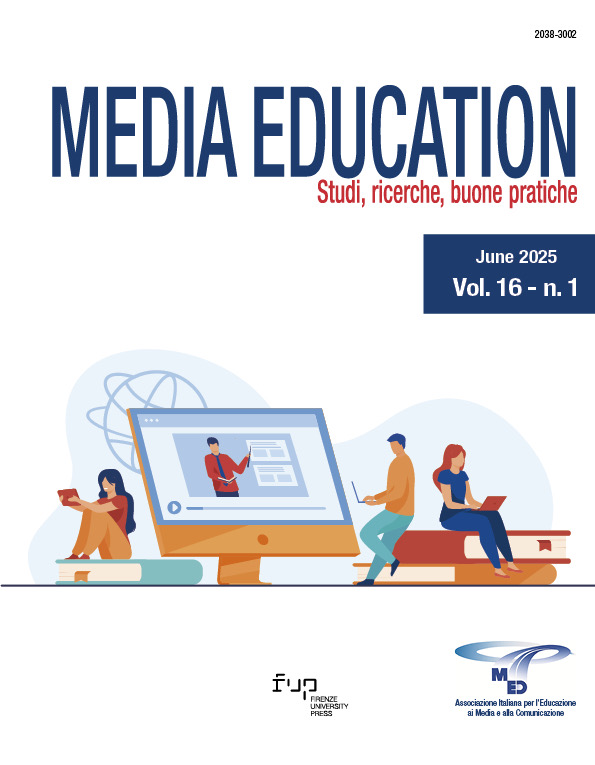Published 2025-06-26
Keywords
- early childhood education,
- digital educational technologies,
- professional development,
- community development,
- digital competence for education
Copyright (c) 2025 Marina De Rossi

This work is licensed under a Creative Commons Attribution 4.0 International License.
Abstract
The University of Padua carried out a research-training path for the development of digital innovation within the Territorial Pedagogical Coordination (TPC) of Parma. The training was aimed at the Coordinators so that they could subsequently implement training and development actions among the staff of the educational services. In this first phase of the research-training project, a survey was carried out among educational staff in 2019 to detect their beliefs on the usefulness of digital technologies and their use in educational work. The questionnaire was constructed by referring to the competence framework of the European document Digital Competence Framework for Educators-DigCompEdu. Subsequently, in the post-Covid phase, the survey was proposed again to detect the change in the perceptions of educators and teachers on the use of digital tools in educational work with children, with the professional community, and in communication with families. This article will present some data from the second administration in 2023. The questionnaire consisted of 22 items with a 5-level scale and 176 educators and teachers responded. The data collected showed responses at the highest levels of the scale in the use of digital tools for educational documentation. Digital educational documentation is used for communication with families and the exchange of experiences in the professional community. The integration of digital technologies in the work with children is widespread at an average level although educators and teachers believe that it is important to educate children in the correct, creative, and responsible use of technologies from their first experiences in educational services. Digital technologies are considered important for learning in specific educational areas such as the language area, the logic-science area, and the music area.
References
- Alasuutari, M., & Kelle, H. (2015). Documentation in childhood. Children & Society, 29(3), 169-173. https://doi.org/10.1111/chso.12119 DOI: https://doi.org/10.1111/chso.12119
- Bazzoli, V., De Rossi, M., Dieci, M., Ferranti, C., Gazza, B., Tarantola, F. (2024). Innovazione digitale in prospettiva di comunità. PensaMultimedia. https://www.pensamultimedia.it/libro/9791255681151
- Bondioli, A., & Savio, D. (2018). Educare l’infanzia. Temi chiave per i servizi 0-6. Carocci.
- European Education Area (2018). Council Recommendation on Key Competences for Lifelong Learning. https://education.ec.europa.eu/it/focus-topics/improving-quality/key-competences [verified 4 March 2024]
- Calvani, A., & Menichetti, L. (2013). La competenza digitale: per un modello pedagogicamente significativo. Italian Journal of Educational Technology, 21(3), 132-140. https://www.learntechlib.org/p/183289/
- Carbotti, S. (2015). App per l’infanzia: linee guida per una progettazione efficace. Form@ re-Open Journal per la formazione in rete, 15(1), 159-169. https://doi.org/10.13128/formare-15396
- Carretero, S., Vuorikari, R., & Punie, Y. (2017). DigComp 2.1: The Digital Competence Framework for Citizens with eight proficiency levels and examples of use. Publications Office of the European Union. https://publications.jrc.ec.europa.eu/repository/handle/JRC106281 [verified 5 March 2024].
- De Rossi, M. (2018), La competenza digitale come processo di sviluppo permanente. In Ferranti C., Giocare e apprendere con le tecnologie, pp. 7-12. Carocci.
- De Rossi, M., & Restiglian, E. (2013). Narrazione e documentazione educativa. Percorsi per la prima infanzia. Carocci.
- Ferranti, C. (2018). Giocare e apprendere con le tecnologie. Carocci.
- Flewitt, R., & Clark, A. (2020). Porous boundaries: Reconceptualising the home literacy environment as a digitally networked space for 0–3 year olds. Journal of Early Childhood Literacy, 20(3), 447–471. https://doi.org/10.1177/1468798420938116 DOI: https://doi.org/10.1177/1468798420938116
- Hostyn, I., Mäkitalo, A. R., Hakari, S., & Vandenbussche, L. (2020). The professional actuation of pedagogical documentation in Belgian and Finnish early childhood education settings. Early Child Development and Care, 190(3), 400-413. https://doi.org/10.1080/03004430.2018.1475368 DOI: https://doi.org/10.1080/03004430.2018.1475368
- Lindeman, S., Svensson, M., & Enochsson, A. B. (2021). Digitalisation in early childhood education: A domestication theoretical perspective on teachers’ experiences. Education and Information Technologies, 26(4), 4879–4903. https://doi.org/10.1007/s10639-021-10501-7 DOI: https://doi.org/10.1007/s10639-021-10501-7
- ONU (2015). Agenda 2030. https://unric.org/it/agenda-2030/ [verified 2 March 2024]
- Mishra, P., & Koehler, M. J. (2006). Technological pedagogical content knowledge: A framework for teacher knowledge. Teachers college record, 108(6), 1017-1054. https://doi.org/10.1111/j.1467-9620.2006.00684.x DOI: https://doi.org/10.1177/016146810610800610
- Redecker, C. (2017). European Framework for the Digital Competence of Educators: DigCompEdu. In Punie, Y. (ed). EUR 28775 EN. Publications Office of the European Union. https://publications.jrc.ec.europa.eu/repository/handle/JRC107466 [verified 2 March 2024].
- Su, J., & Yang, W. (2024). Digital competence in early childhood education: A systematic review. Education and information technologies, 29, 1-49. https://doi.org/10.1007/s10639-023-11972-6 DOI: https://doi.org/10.1007/s10639-023-11972-6
- Undheim, M. (2022). Children and teachers engaging together with digital technology in early childhood education and care institutions: A literature review. European Early Childhood Education Research Journal, 30(3), 472-489. https://doi.org/10.1080/1350293X.2021.1971730 DOI: https://doi.org/10.1080/1350293X.2021.1971730
- Vuorikari, R., Kluzer, S.. & Punie, Y. (2022). DigComp 2.2: The Digital Competence Framework for Citizens – With new examples of knowledge, skills and attitudes. Publications Office of the European Union. https://publications.jrc.ec.europa.eu/repository/handle/JRC128415?fbclid=IwAR2oU4AP-0aj8mp8sMfTLRgvC9ZpuaO7a942d1b8UC3YCnC0bdnu88-G5XY [verified 4 March 2024].

